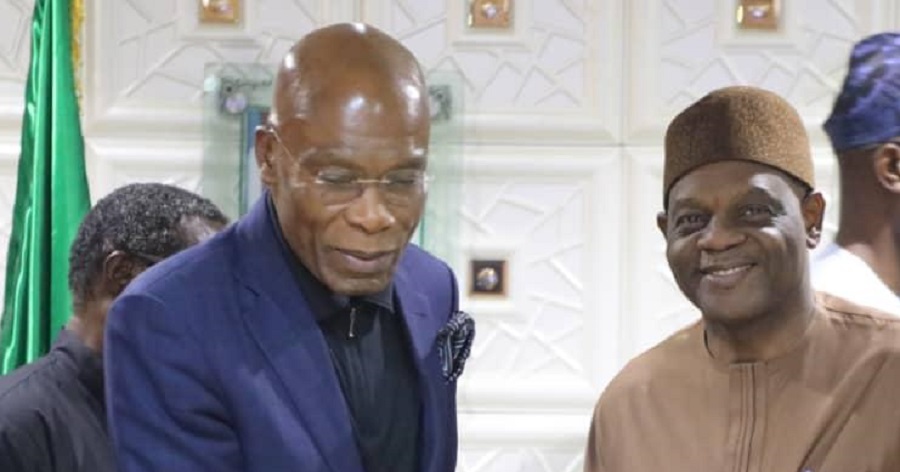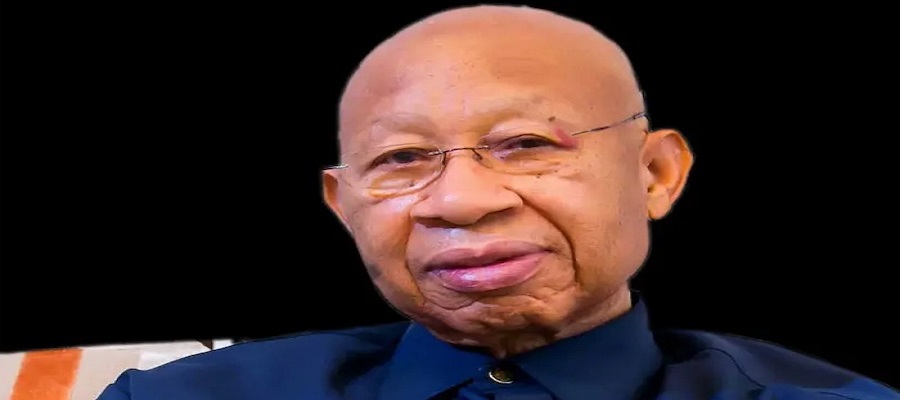News
Customs Mulls the Use of AI, Advanced Technology to Check Smuggling in 2024

The Nigeria Customs Service (NCS) said advanced technology, including data analytics and artificial intelligence will be explored to enhance intelligence gathering and enforcement capability against smuggling in 2024.

Dr. Ben Oramalugo, the Customs Area Controller, Oyo/Osun Command, made the disclosure at a press briefing on the performance of the command in 2023, as he outlined strategic plans for 2024.
According to him, the command’s strategic focus areas include enhanced collaboration with other law enforcement agencies, neighbouring commands and international partners to improve intelligence sharing and facilitate joint operations where possible; and investing in the continuous in-house training and skill development of Command personnel, to ensure they remain abreast of the latest trends in smuggling and customs enforcement.
“The Command will expand the use of advanced technology, including data analytics and artificial intelligence, to enhance our intelligence gathering and enforcement capability.”
Oramalugo stated that between November 11, 2023, and December 31, 2023, the command collected ₦5,030,694,597.05 and ₦7,173,852,130.48 respectively into the Federation and Non-Federation Accounts.
“When added to the sum of ₦59,087,983,670.64 already collected for the period of January to October 2023, the cumulative sum of ₦71,292,530,398.17 was collected for the fiscal year of 2023.
He revealed that the command intercepted and seized many contraband goods worth N95,968,540 within the period, including one bale and two sacks of used bags; seven bales and two sacks of used shoes; three units of motor vehicles; 12 sacks and four wraps of cannabis sativa; and 11,850 litres of Premium Motor Spirit (PMS).
The list also comprised 1,341 pieces of used tyres; two bales of used belts; 194 bags of foreign parboiled rice (50 kilogrammes each); as well as 114 bales and two sacks of used clothings.
“When added to the worth of contraband goods already seized between January and October 2023, with a DPV of ₦358,267,019.00 the cumulative sum of ₦454,235,559.00 is the DPV of contraband goods intercepted and seized for the year of 2023.”
The command, between January 1st and 18th 2024, also intercepted and seized 70 bags of foreign parboiled rice, 3,325 litres of petrol, 100 pieces of timber, and one unit of motor vehicle, with total DPV of N30,464,500.
News
Zinox Technologies, TETFUND Collaborate for Tech-Driven Sustainable Future in Tertiary Schools

Zinox Technologies Limited, a leading ICT solutions provider in West Africa, has engaged with the Tertiary Education Trust Fund (TETFUND) in Abuja, marking a significant step towards advancing innovation and sustainable energy solutions within Nigeria’s tertiary education landscape.

Dr. Leo Stan Ekeh, Zinox Chairman (left) and Arc. Sonny Echono, Executive Secretary, TETFUND (right) after the meeting
Under the theme “Advancing Innovation for a Sustainable Future,” the meeting aimed to establish a collaborative framework for technological transformation.
The Zinox delegation was led by Dr. Leo Stan Ekeh, its chairman, and included key members of the company’s executive management team.
On the TETFUND side, Arc. Sonny Echono, executive secretary, was joined by members of his top management team for the high-level discussions.
The highlight of the visit was the establishment of a strategic partnership between Zinox Technologies and TETFUND to provide renewable energy solutions to universities and polytechnics across Nigeria.
Additionally, Mrs. Kelechi Eze-Okonta, managing director, delivered a comprehensive, world-class presentation on the company’s diverse verticals and advanced ICT services, underscoring the need for intentional policy measures to support indigenous technologies for sustainable economic growth.
The TETFUND team expressed their appreciation for Zinox’s contributions to technology awareness, implementation, and adoption in Africa.
Arc. Sonny Echono, executive secretary of TETFUND, conveyed his deep appreciation for the visit by the Zinox team and commended Dr. Leo Stan Ekeh for his unwavering and impactful contributions to Nigeria’s digital transformation, stating that efforts are underway to establish a framework for effective energy solutions in tertiary institutions.
Highlighting Zinox Technologies’ expertise and proven track record, Arc. Echono expressed optimism about partnering with the company to develop scalable and efficient power solutions for academic institutions.
While both organizations remain committed to implementing innovative initiatives that enhance institutional capacity across the nation’s higher education sector, the visit marks a significant milestone in establishing a strategic partnership to equip Nigeria’s tertiary institutions with the essential technological infrastructure for a sustainable, digitally-driven future.
News
MTN Pens Moving Tribute to Pascal Gabriel Dozie, Former Chairman

In a heartfelt tribute, MTN has hailed late Dr. Pascal Gabriel Dozie, an exceptional leader, steady hand and enduring legacy.

Pascal Gabriel Dozie, Former Chairman
In the tribute, MTN said it was deeply saddened by the passing of Dr. Dozie, founding chairman of MTN Nigeria.
He passed away at the age of 85
“We extend our heartfelt condolences to his family, friends, and all who had the privilege of knowing and working with him” the telecom giant said.
A pioneer, statesman, and titan of industry, Dr. Dozie played a pivotal role in the emergence of mobile telephony in Nigeria and in shaping the MTN Nigeria story.
He brought insight, experience, and leadership at a time when bold vision was essential.
He was instrumental in securing the early support and investment that brought the Y’ello dream to life. On May 16, 2001, he made the first call on the MTN network, a historic moment in Nigeria’s telecommunications journey.
For 18 years, from 2001 to 2019, Dr. Dozie served as Chairman, leading with strength and conviction.
His presence on the Board was unifying. He championed good governance, corporate responsibility, and long-term value, deeply committed to the greater good. In challenging times, he remained a stabilising force.
“His unwavering belief in Nigeria’s potential and his dedication to its development were truly inspiring. His leadership at MTN Nigeria laid the foundation for our success, and his legacy will continue to guide us in the years to come,” Karl Toriola, CEO, MTN Nigeria.
Some of his landmark contributions include:
The incorporation of the MTN Nigeria Foundation in 2004 and our commitment to dedicating a percentage of profit after tax to social investments;
The launch of one of Africa’s largest switching centres in 2010;
His significant role in 2015 during critical conversations around the regulatory fine and its resolution;
The introduction of Africa’s first 3G feature phone in 2018;
MTN Nigeria’s listing in 2019 on the premium board of the Nigerian Exchange.
“Dr. Dozie was instrumental in MTN Group’s expansion into Nigeria, providing visionary leadership that has left an indelible mark on our company’s history. His commitment to excellence and integrity set a standard that we continue to uphold,” Ralph Mupita, president & CEO, MTN Group.
His legacy goes well beyond MTN. He believed in Nigeria’s potential and dedicated his life to building a stronger nation.
His impact spanned banking, telecommunications, education, and public service.
He founded Diamond Bank, led the Nigerian Economic Summit Group, and served as Director of the Central Bank of Nigeria, among many other distinguished roles. A generous mentor, he inspired and guided countless individuals who continue to uphold the values he lived by.
He was a quiet revolutionary. He could ease tensions with grace and consistently led with clarity and conviction.
He was warm, principled, and deeply respected by all who encountered him.
Fondly known as PGD, he was honoured with the national awards of Officer and Commander of the Order of the Niger (OON and CON).
Beyond the accolades, what we remember most is the man himself. He was innovative, dedicated, measured, thoughtful and humble.
“We are profoundly grateful for his time with us. His memory will remain a guiding light for MTN, Nigeria’s business community, and everyone who shares his unwavering commitment to progress built on integrity and service” MTN stated
News
NIGCOMSAT, Jigawa State Empower 150 Youths on Satellite New Innovations

Nigerian Communication Satellite Limited (NIGCOMSAT) in collaboration with Jigawa state government, commenced training of 150 youths on satellite technology and digital communication.

Jane Egerton-Idehen, managing director, NIGCOMSAT limited,
Speaking at the opening ceremony of the training, held at Manpower development Dutse, Jane Egerton-Idehen, managing director, NIGCOMSAT limited, highlighted the role of NIGCOMSAT in driving grassroots innovation in Jigawa state.
She explained that, the training is organised by Nigcomsat supported by Jigawa state government with the theme: “Space Technology for grassroots development”, aimed at empowering youths on digital innovations to create jobs opportunities and boost economy.
“The Nigcomsat youth empowerment programme, Jigawa is a groundbreaking initiative aimed at equipping young minds with cutting-edge knowledge in satellite technology and digital communication”, she said.
The MD maintained that, the program designed to Foster innovation, enhance technical skills and create opportunities for youths in the ever-evolving space-tech industry.
According to her, during the training two key sub-program will be featured, Spacehack 2025 aimed at developing satellite technology to tackle real world challenges in areas like agriculture, disaster management, telecommunications and security issues.
She maintained that, the other part of the training focused on Very Small Aperture Terminal (VSAT) technology, a satellite communication system that uses small antennas to transmit and receive data, voice, and vedio signals.
In his remarks, Dr Habib Muhammad Ubale, director general, Jigawa State Economic Empowerment and Youth employment agency, urged the participants to concentrate, acquire the skills and stepdown the skills to others for better development.
Dr. Habib who is the effort is one of the twelve points agenda of Governor Malam Umar Namadi said, the training will create thousands of jobs, improve economy and reduce security challenges in the state.

 Broadcasting2 days ago
Broadcasting2 days agoMTN Battles Netflix, Showmax with New Streaming Platform

 News2 days ago
News2 days agoHow KongaFM 103.7 Helped Cure My Insomnia Challenge

 News2 days ago
News2 days agoFG to Invest in Cutting-edge Broadcast Technology

 Broadcasting2 days ago
Broadcasting2 days agoFG Begin Technical Upgrade of Government-Owned Media

 Broadcasting2 days ago
Broadcasting2 days agoProf Osinbajo Seeks Stronger IP Protection in Nigeria, Africa

 General News2 days ago
General News2 days agoMart Networks Brings Comprehensive Cybersecurity Solutions from Infopercept to Africa

 General News2 days ago
General News2 days agoOneData Revolutionizes Caleb University Campus Connectivity, Empowering Students for the Digital Age

 General News2 days ago
General News2 days agoEvans Woherem’s Book, “Building A New Africa” Charts Bold Vision For Africa’s Future















